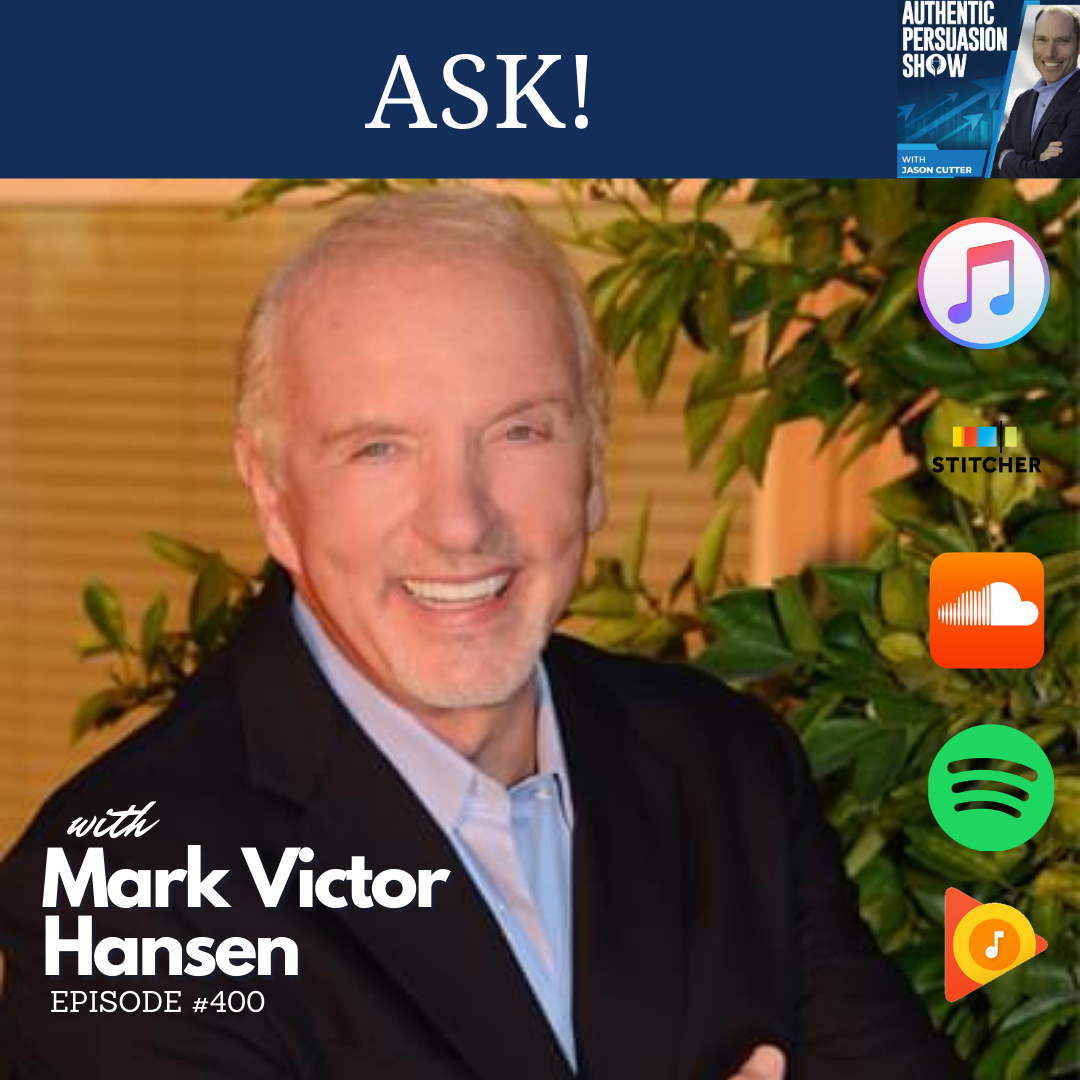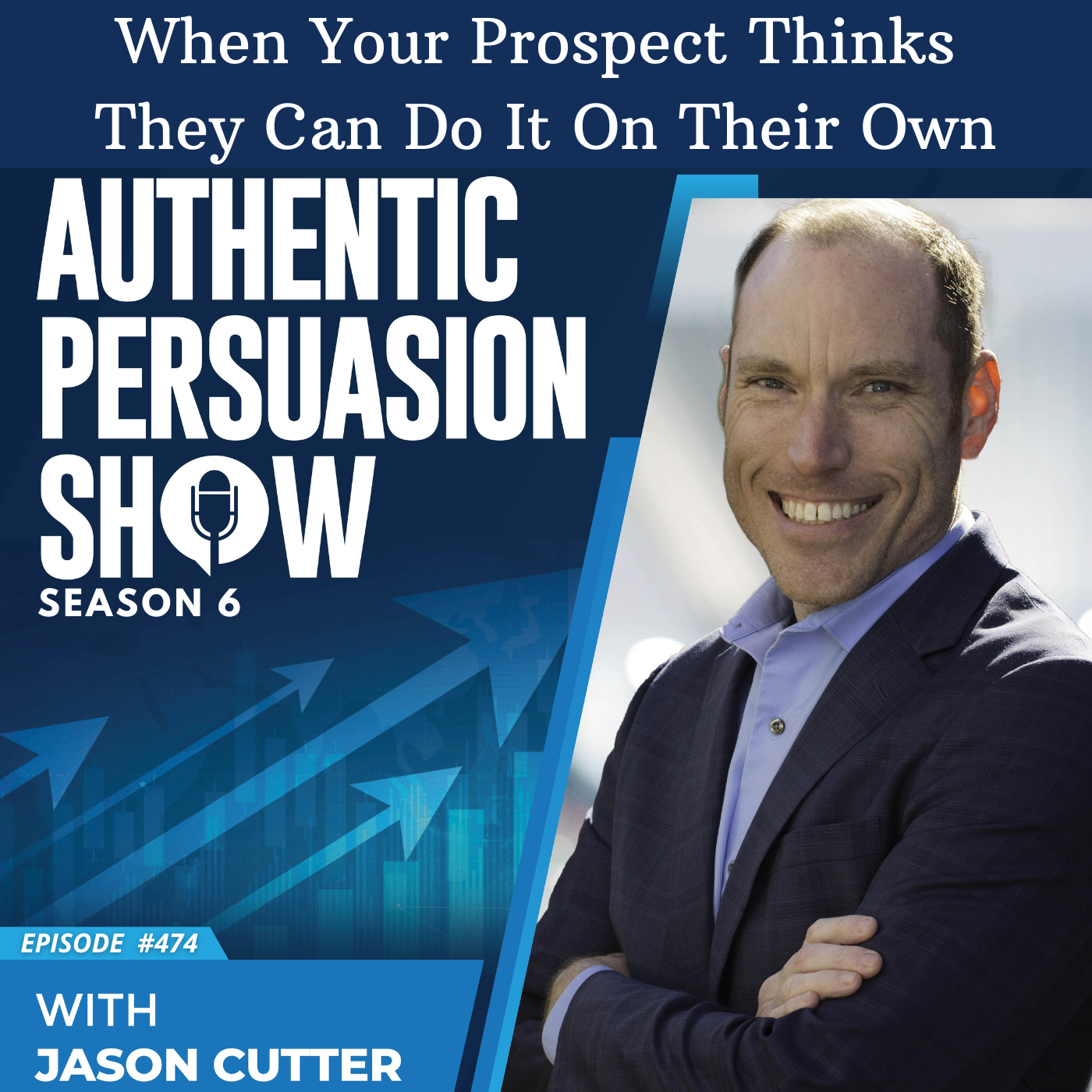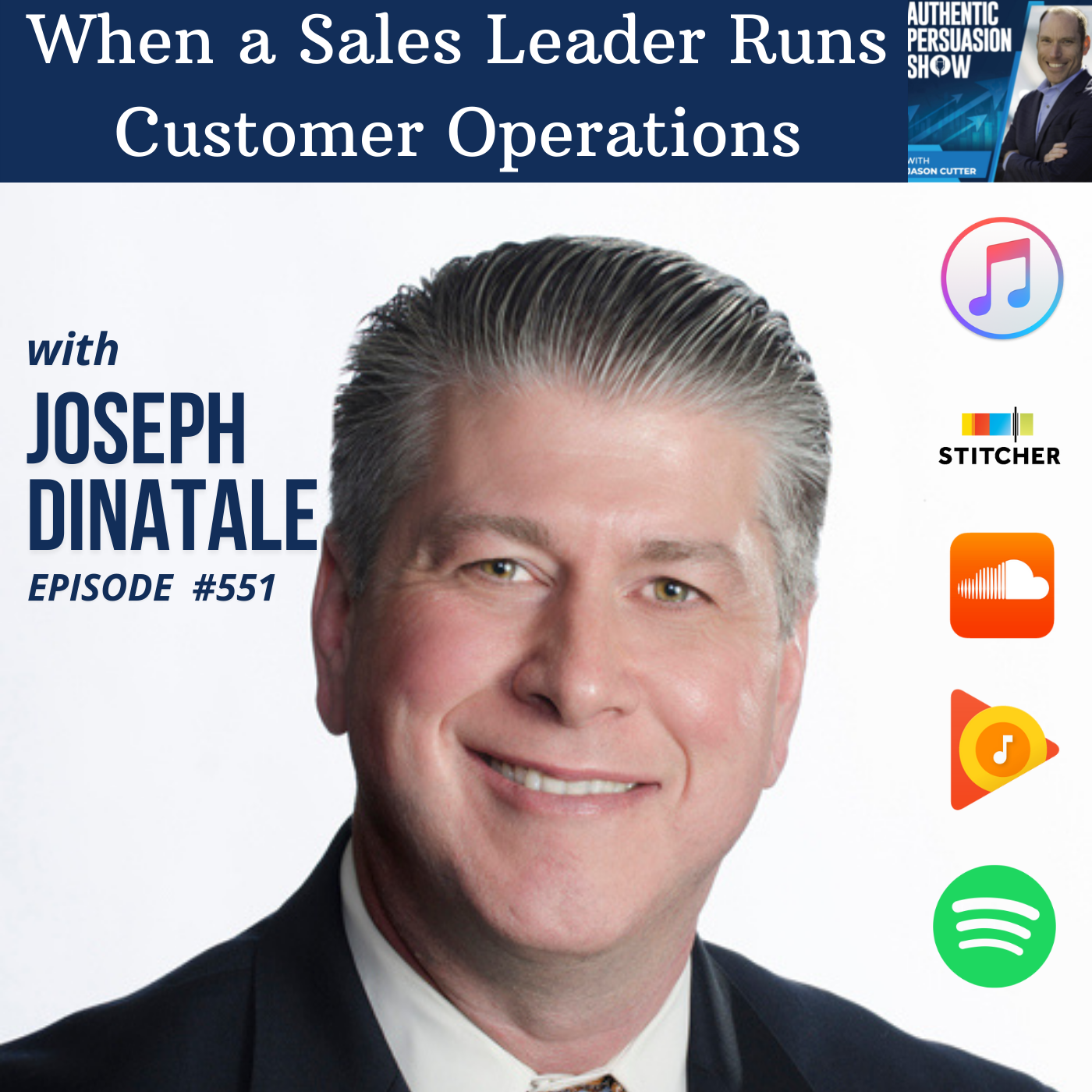Episode Transcript
Jason [00:00:00]:
This is the authentic persuasion show. This keeps coming up as a topic in conversations and training that I'm doing. And I know that I talk about this from time to time on the podcast and online, but I'm going to cover it again. One of the biggest things that keeps happening and I keep seeing is that people in sales think their job is to be the hero. They think their job is to be a product expert that's pushing a product on other people because they believe that product is amazing. Being the hero with a product that is there to save the day means that the company has told you how amazing it is. You know how amazing it is.
Jason [00:00:45]:
Maybe it's your own company and your own product and you're selling that or you work for someone else. You've essentially drank the koolaid and bought into everything that's on the website, on the brochure, on the slide deck about how amazing what it is that you're offering is to the people who buy it, the right people that buy it, everyone on the planet. I don't know. Like, I've seen the wide range on it. Now, here's the big thing, is that's not an issue in itself. That's important. If you're selling something that you don't believe in or something that doesn't actually help people, then please stop. You're probably one of the reasons why sales feels gross to a lot of people out there.
Jason [00:01:24]:
When somebody sells something they don't believe in or that's not actually valuable or needed or wanted. Now, I'm assuming that you're here listening to this show, the authentic persuasion show, because you're not that kind of person. But maybe you are and you want to change and you want to do things different. So thinking that you're amazing, thinking that what you're selling is what everyone out there is going to want, or at least the right people are going to want, that's not the issue. That's not my problem. That's not the rub that I have with people in sales. The challenge I have and where it's completely ineffective anymore at scale is leading with that. Talking about yourself being amazing and telling everybody how amazing you are in the beginning of the conversation.
Jason [00:02:09]:
Think about this, right? Think about if you've ever gone to a party or think about the last time you went to a party or you went to a bar or a restaurant and you met somebody new that you didn't know before. And all they do is talk about themselves, right? They don't ask you a single question. Maybe you ask them a question, hey, what do you do for a living? And then they just go on this long monologue and they're talking about all their stuff that they do and their accomplishments, maybe their vacation, their house where they live, their car, their job. Like their clients, their name dropping. Right? They're that name dropper, that person who's just talking about themselves so that you know how important they are and how amazing they are, because that's what they want you to believe if you're ever in that situation. When I get in that situation, I'm like, stop, I got it. You're amazing. But I don't know if I care.
Jason [00:03:01]:
And I don't know if I care right now because we just met. The other thing is if you've ever been in a kind of dating scenario where you encounter somebody like that, right? So let's say you're single and you meet somebody or go out on a date, or you just meet someone at random, and all they do is talk about themselves and they don't seem to care about you. I'll tell you, I think most people would probably admit, either at first or ultimately, that they don't like that. It doesn't make them feel like the person cares. It doesn't make them feel like the other person is interested in them at all. And it's fascinating how people in sales still tend to go that route where there's so many people in sales that I encounter, that I watch, that I see, that I listen to recordings of that I deal with at conferences, trade shows, sales calls that they're trying to sell me, where all they're doing is leading with themselves and themselves and themselves and their company and their product and their logos and their awards and their social proof and their testimonials and the people who think they're amazing. And it just doesn't work. And I know it's not just me because I know it just doesn't work in general.
Jason [00:04:18]:
And here's why. Because humans only care about themselves. The problem is you got that salesperson in that role who only cares about themselves and think everyone else cares about them because they think they're amazing. And they think their job is to tell you how amazing they are because they think that's what sales is, tell you how amazing they are, tell you how great their product is, and then overcome every objection you have until you don't have a choice but to say yes. Right. That's what they think. Sales is still as their job, but as humans, we all only care about ourselves, which means that potential customer you're talking to only cares about themselves. And of course, they do care about you.
Jason [00:04:55]:
Everyone cares about other people or will care about other people, but fundamentally they only care about themselves first. And that's why if you're in sales and you're listening to this, or if you lead a team and you have a team of salespeople, or you're going to build a team of salespeople, you need to fundamentally change the sales process. It is important for you to talk about yourself. It is important to build trust. It is important to convey credibility and show people that you are credible as a company, as a product, a service, as an individual. Those things are very important. But not at first because nobody cares, right? There is a quote that's attributed to Teddy Roosevelt, which is kind of cliche, it sounds kind of cheesy. I mention it all the time and then I explain why it's so important and so many light bulbs go off for salespeople because they didn't think about it.
Jason [00:05:45]:
But again, remember, we're all human. So when you're not selling something, you're a customer in your daily life and think about how you like to be treated and sold to, right, and interacted with so that you can buy. And so the quote is, nobody cares how much you know until they know how much you care. And it is so true. So many people by default think that the best way to get you to care is to talk about how much I know. Right? But again, the quote, nobody cares how much you know until they know how much you care. It doesn't say nobody cares how much you know, period. But the part that's important is they have to know how much you care first.
Jason [00:06:25]:
That's why the first two stages in the authentic persuasion pathway is rapport and empathy. And empathy being the discovery process, but done with actual care and concern. Where you're using active listening, you're actually asking questions because you care. You want to know what makes them tick. You'd want to know their deepest reasons why they are in need of or want to buy what you have to offer or what you're selling. And those are the first two phases, right? It's not talk about yourself and then do those things. It's rapport and then empathy, and then is trust and credibility. Then the next phase, the third phase is then when you talk about yourself.
Jason [00:07:07]:
And part of this is, if you really want to be pragmatic about it, why spend time talking about yourself if you don't even know if they qualify, if they're not a good fit, if they're not interested, if it doesn't make sense. Again, I've had this experience where I've walked up to enough trade show booths, at conferences and expo halls where I walk up and they just immediately start going through their monologue. Two minutes, three minutes, five minutes of explaining. They're just on autopilot. They're talking about themselves. They think their job is every warm body that comes up. They should just pitch. And then it gets to some point where I go, yeah, that's not me.
Jason [00:07:42]:
That doesn't make sense. I don't run that kind of company. I don't have that kind of need. It doesn't make sense. And they say, okay, well, thanks. Do you want a free pen or a stress ball? And have a good conference? Right? They just wasted all that time, theirs and mine. And so pragmatically, it doesn't make sense to do that because you don't even know if it's worth doing that and explaining who you are. Again, going back to a dating type scenario, you can tell someone how amazing you are and all about yourself if you might be interested in dating that person.
Jason [00:08:11]:
But it'd probably be good to know if they're actually single. And if you like them and more about them, then you can talk about yourself before you go on about all of your accomplishments. Now, fundamentally, just not even the pragmatic side is people want to know that you care about them first. People want to know that you care about them. You understand them. You understand that they're different and they're special and they're unique, and they have their own stuff going on. And once you get to that point, once they feel like you care about them, then they will listen to you. Then they will want to know what you know.
Jason [00:08:48]:
Right? It's why most people will only slightly tolerate a doctor with a terrible bedside manner. They have to be amazing at what they do. They have to be, like, a world class leader in whatever it is that they specialize in to offset a terrible bedside manner. Because a terrible bedside manner means you don't care about me as a patient. You just see me as a patient, and then you just want to do what you do. But you really don't care about me, right? You better be an amazing doctor, and I better not have a choice, and my pain better be so terrible, I'm willing to tolerate that. Most people aren't selling life and death. Most people aren't dealing with customers who are in so much pain.
Jason [00:09:26]:
And you own the monopoly on the solution, where they were tolerate your bad bedside manner, where they were tolerate the fact that you don't make them care or seem like you care prior to the transactional part of the sale. And so remember that. Remember this. Like, if you made this your mantra, people don't. Nobody cares how much you know until they know how much you care. If you remember that, and you combine that with the authentic persuasion pathway, and if you want more details on that, you can go to cutterconsultinggroup.com and find it on there, find the framework, find the information about it, and then if you have questions, you can reach out to me. If you run a team and you want your team trained on this and you want to totally shift their mindset away from what they're doing, that I promise doesn't work at scale into something that's more effective right now, then definitely reach out to me so we can set up a time to talk and see how we can put in some training in place for you. But remember, nobody cares how much you know until they know how much you care.
Jason [00:10:23]:
When you build your sales, process us in that order, remembering who matters most, which is them, and put them first in the beginning of the conversation, then you will win.
![[640] Sales Lesson from Teddy Roosevelt](https://episodes.castos.com/salesexperiencepodcast/images/1541878/Sales-Lesson-from-Teddy-Roosevelt.png)


